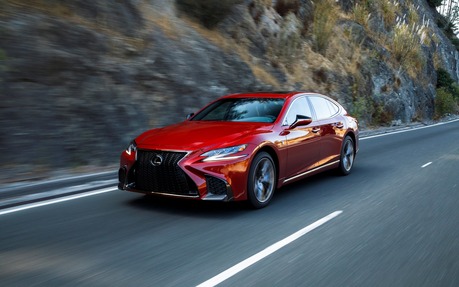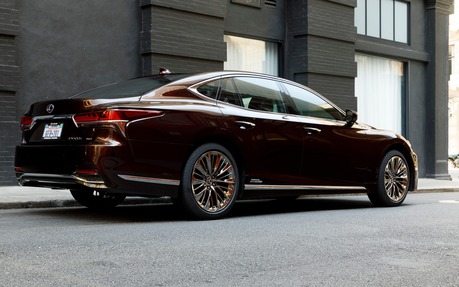2018 Lexus LS 500h and LS 500 F SPORT: More is Less
SAN FRANCISCO, California – While attending the launch of the new fifth-generation Lexus LS, we were also able to drive the hybrid LS 500h and the LS 500 F SPORT—two much less satisfying variants than the LS 500.
The LS 500h uses the same drivetrain as the hybrid Lexus LC 500h coupe, made up of a 3.5-litre naturally aspirated V6 and an electric motor that develops a total of 354 horsepower and a maximum torque of 261 lb.-ft. And just like the LC 500h coupe, the LS 500h is equipped with the new Multi-Stage Hybrid automatic gearbox that is comprised of a CVT with two electric motors and a four-speed automatic. That means two transmissions working in concert to reproduce the effect of a single 10-speed gearbox.
Unconvincing
To put it mildly, this hybrid drivetrain is not consistent with the LS 500h’s main purpose: luxury. Under flat-out acceleration, the conventional engine’s sound lacks both character and refinement, which is disappointing to be perfectly frank. While the sound of the LS 500’s twin-turbo V6 is assertive, that of the LS 500h’s naturally aspirated V6 is disappointing.
The LS 500h is heavier and less powerful than the LS 500, and that has a negative impact on performance to the tune of 5.5 seconds for the 0-100 km/h sprint—nearly a second slower than the LS 500. The Multi-Stage Hybrid gearbox is unsuitable for sporty driving with very artificial responsiveness, but it helps improve fuel consumption in normal driving conditions (9.1 litres per 100 kilometres). Basically, don’t drive the LS 500h enthusiastically to avoid disappointment.

Hybrid yes, rechargeable no
The other problem—and it’s a doozy—is that the 2018 Lexus LS 500h is a classic hybrid and not a plug-in. In this regard, the LS 500h is well behind two German rivals with rechargeable hybrids, the BMW 740Le as well as the Mercedes-Benz S 560e that was recently unveiled at the Frankfurt Motor Show and is replacing the current S 550e released in 2016. Both luxury cars are plug-ins, guaranteeing better electric range. In a nutshell, we were expecting better in terms of refinement—both for driving thrills as well as for the degree of technical sophistication.
The LS 500 F SPORT
Despite its name, the 2018 Lexus LS 500 F SPORT has the same twin-turbo V6 engine and automatic transmission as the LS 500. Therefore, power and torque are identical for both versions. The LS 500 F SPORT settles for subtle design changes to the grille and the letter F inscribed on the body, lower part of the doors and steering wheel. There’s also an Ultrasuede-lined roofliner.
The wheels are larger too—245/45RF20 tires in front and 275/40RF20 in back—and the brakes are oversized compared to those of the LS 500. The F SPORT version features 400-millimetre discs in front (versus 357 mm) and six-piston callipers along with 359-millimetre discs (instead of 335 mm) and four-piston callipers in back. That meagre list is all of it. The thrills at the wheel are very similar to those of the LS 500, with a slightly more confident engine sound and a slightly sportier ride.

Waiting for the LS F in Tokyo
To take on the Mercedes-AMG S 63 with its 603-horsepower twin-turbo V8, the BMW M760Li with its 600-horsepower V12, or even the BMW Alpina B7 and its 608-horsepower turbo V8, Lexus is going to have to come up with another, more dynamic version of the new LS—and in short order!
Rumours are swirling that the world debut of a Lexus LS F powered by a 600-horsepower, twin-turbo 4.0-litre V8 engine and with a much sportier body is in the works for the upcoming Tokyo Motor Show in October. The Car Guide will be there and we’ll be following the evolution of this new, higher-performance version of the Lexus LS very closely.
| Test drive report | |
| Test model | 2018 Lexus LS |
|---|---|
| Trim level | 500h AWD |
| Price range | N/A |
| Price as tested | N/A |
| Warranty (basic) | 4 years/80,000 km |
| Warranty (powertrain) | 6 years/110,000 km |
| Fuel economy (city/highway/observed) | N/A |
| Options | N/A |
| Competitive models | Audi A8, BMW 7 Series, Cadillac XTS, Jaguar XJ, Mercedes-Benz S-Class, Tesla Model S |
| Strong points |
|
| Weak points |
|
| Editor's rating | |
| Fuel economy | Average fuel consumption is 9.1 litres per 100 kilometres for the LS 500h. |
| Comfort | Regal on smooth surfaces; new, very comfortable front seats. |
| Performance | The LS 500h’s engine disappointingly lacks character and refinement, while the F SPORT’s powertrain is identical to that of the LS 500. |
| Infotainment | Remote Touch is not very user friendly. No Apple CarPlay or Android Auto. |
| Driving | We were expecting more from the F SPORT version. |
| Overall | The LS 500h and LS 500 F SPORT are not as polished as the LS 500. |
